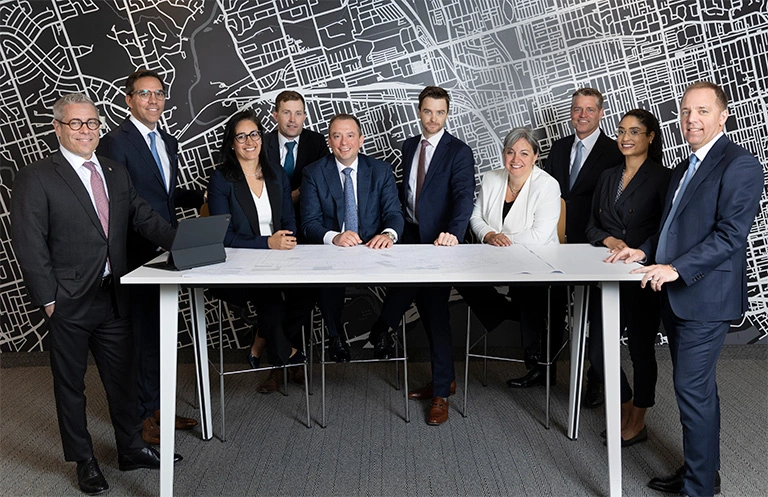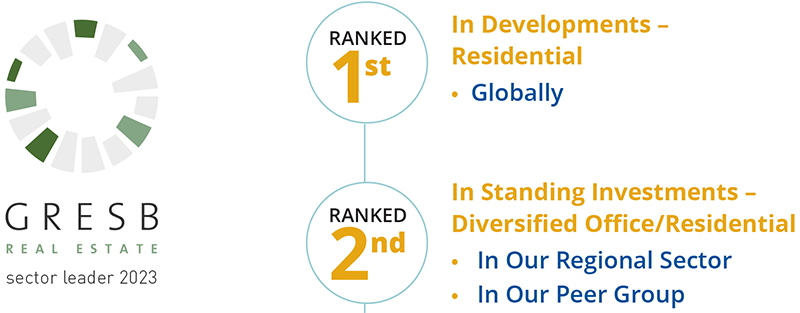Goals
| Responsible Investments | Target Year | Target Objective |
|---|---|---|
| Maintain GRESB 5 Stars | Annually | Y/N |
| Submit first report to the Principles of Responsible Investment | 2023 | Y/N |
| Publish a Responsible Investing Policy | 2023 | Y/N |
| Conduct climate risk assessments in CREIF | 2023 | Y/N |
| Conduct corporate-wide governance review | 2023 | Y/N |
Next Steps
- Improve ranking in PRI Fixed Income module
- Incorporate findings from third-party governance review
Governance
KingSett’s Board of Directors, Management Committee and Sustainability Committee are dedicated to strong governance practices that prioritize transparency and accountability and promote integrity and ethics while delivering sustainable premium risk weighted returns. These are key tenants of our core values and essential elements of our overall approach to governance.
Oversight and accountability of sustainability risks and opportunities associated with the ownership, development and management of real estate across an asset’s lifecycle is a top priority. KingSett’s governance framework ensures representation from all relevant business functions.
We operate as a values-based organization, embedding strong governance practices across the company

Our approach to governance is composed of:
- Oversight of strategy and all conflicts by a number of independent Advisory Boards
- Engagement of professional firms to provide insight and advice across the business
- Engagement of property management firms and joint venture or third-party partners to operate our properties and execute the strategy
- Independent audits of the financial statements and sustainability metrics
- Strong alignment with KingSett principals and employees
- Incorporating third-party standards such as GRESB, GRI and PRI
- Robust internal governance policies and corporate controls
- Regular and transparent investor reporting, including sustainability performance
- Active risk and asset management
Governance of Climate-related Risks and Opportunities
Stakeholder Engagement
We aim to build relationships with all our stakeholders. Doing so ensures we fulfill our commitments and create shared value through our business activities.
KingSett’s stakeholder engagement activities ensure relationships are built and upheld with respect, integrity, transparency and honesty. Ongoing communication and working collaboratively towards mutually beneficial outcomes are key components in achieving this.
Our engagement programs, at the corporate and property level, are used to generate ideas, solicit feedback, identify best practices and determine the impact of our efforts. Receiving feedback in different forms and from our various stakeholder groups helps ensure our programs are designed to meet the needs of our communities and enhance the performance of our assets.
Our stakeholders include:
- Employees
- Tenants
- Property Managers
- Partners and Investors
- Communities
- Industry Associations
- Customers
KingSett Engages Stakeholders in a Variety of Ways:
Dashboards
Property and asset managers review asset-specific sustainability dashboards prior to and during budget planning
Social Media
Social media posts highlight key corporate and asset achievements across all portfolios
Reporting
Our annual Sustainability Report and website provide an in-depth review on sustainability throughout the organization and holds us accountable for the commitments we make
Regular Updates
Our Management Committee and CREIF Advisory Board receive quarterly sustainability updates that include Portfolio case studies, progress and highlights on sustainability issues and trends
Surveys
We survey our tenants and employees to help guide our efforts to increase satisfaction, communication and well-being
Thought Leadership
We continuously engage within our government and industry, sharing best practices, new ideas and thought leadership
Industry Participation
We participate in a number of industry and community associations as members and board of directors to share best practices, ideas and guidance
Employee Development
Our talent managers and social committee members initiate a variety of new and ongoing social and employee development programs throughout the year
Targets
CREIF Investors and other stakeholders receive regular updates on progress towards achieving our targets
Engagement
Our property teams engage with asset managers, tenants and communities in their day-to-day functions and hold tenant and community events throughout the year
Risk Management
We take an active role in identifying and mitigating risks associated with owning, developing and managing real estate in Canada.
Our process for identifying and assessing risks and opportunities, including sustainability and climate-related risks, is embedded into our day-to-day business operations. We take action to mitigate and monitor risks, particularly those that could significantly affect KingSett’s reputation, financial performance or business operations.
Sustainability risks, in particular climate risks, continue to be a growing concern for investors and stakeholders. We proactively take steps to improve the climate resilience and energy efficiency of our assets and manage the physical and transition risks of climate change.
Our approach to managing risk at the property-level follows the basic principles of ISO 14001.
Plan
We establish policies and measure and analyze performance data through management systems, assessments, real-time monitoring, surveys and target setting
Do
We develop and execute these plans, including conservation measures, replacing existing systems and installing products with environmentally friendly alternatives
Check
We monitor the impacts of projects and actions through energy audits, commissioning, follow-up assessments and real-time monitoring
Act
The results of these steps inform our strategies on the effectiveness of our actions, influences our policies and helps us achieve our targets
UN Principles for Responsible Investment
The Principles for Responsible Investment (PRI) is the most widely adopted sustainability integration standard that enables asset owners and managers to publicly demonstrate a commitment to responsible investment and contribute towards building a more sustainable financial system.
In 2023, we completed our first formal submission to the PRI. KingSett scored above the median PRI ranking in both the Policy, Governance and Strategy, and Direct – Real Estate modules, indicating that KingSett has strong policy, governance, and strategy processes, especially in our real estate business. Post-submission, we identified opportunities to improve, specifically within our mortgage operations. In 2023, we implemented new processes and practices to continue to integrate ESG considerations into our business including increased coverage of the tracking and documentation of sustainability factors across our mortgages operations. We anticipate improvements to our score as we look forward to our submission in 2024.
GRESB
KingSett Capital is a proud participant in GRESB and has responded to the Assessment since 2015. In 2023, KingSett ranked first globally in our peer group for the Developments Benchmark and second in our peer group for standing investments.
"We use third-party standards such as GRESB to demonstrate our ability to turn sustainability policies and goals into verifiable results and ensure we are focused on the material aspects of real estate that will drive value.”
— Kit Milnes, Vice President, Sustainability and Resilience

Climate Disclosures
KingSett is committed to being transparent about our climate change risks and environmental performance and progress. To do so, we align our disclosures with the Task Force on Climate-related Financial Disclosures (TCFD) Recommendations. The table below outlines where you can find our climate disclosures.
| Recommendation | Location | |
|---|---|---|
| TCFD Goverance A | Describe the board’s oversight of climate-related risks and opportunities | Governance |
| TCFD Governance B | Describe management’s role in assessing and managing climate-related risks and opportunities | Governance |
| TCFD Strategy A | Describe the climate-related risks and opportunities the organization has identified over the short, medium and long-term | Climate Risk and Resilience |
| TCFD Strategy B | Describe the impact of climate-related risks and opportunities on the organization’s businesses, strategy and financial planning | Climate Risk and Resilience |
| TCFD Strategy C | Describe the resilience of the organization’s strategy, taking into consideration different climate-related scenarios, including a 2°C or lower scenario | Climate Risk and Resilience |
| TCFD Risk Management A | Describe the organization's processes for identifying and assessing climate-related risks | Climate Risk and Resilience |
| TCFD Risk Management B | Describe the organization's processes for managing climate-related risk | Climate Risk and Resilience |
| TCFD Risk Management C | Describe how processes for identifying, assessing, and managing climate-related risks are integrated into the organization's overall risk management | Risk Management |
| TCFD Metrics and Targets A | Disclose the metrics used by the organization to assess climate-related risks and opportunities in line with its strategy and risk management process | Climate Risk and Resilience |
| TCFD Metrics and Targets B | Disclose scope 1, 2 and if appropriate, 3 GHG emissions and related risk | GRI Index |
| TCFD Metrics and Targets C | Describe the targets used by the organization to manage climate-related risks and opportunities and performance against targets | Decarbonization |